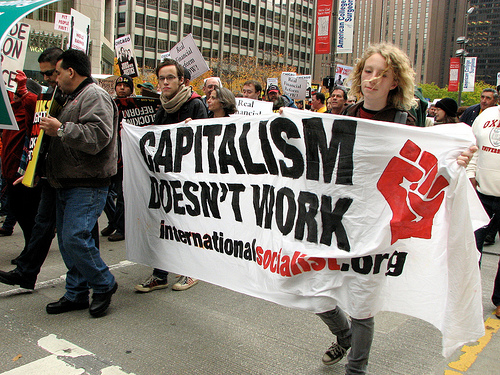Does Capitalism equal human nature?
Originally: Glossary of Major Distortions {Part One}, Cyrano’s Journal of Politics Media and Culture Wars
(FROM OUR ARCHIVES—NOTE: First published in 1982; revised July 2013)
By Patrice Greanville
Does Capitalism equal human nature?
 THIS PROPAGANDA EQUATION, making capitalism and “human nature” inseparable, is one of the oldest and most effective ideological weapons utilized in the defense of capitalism. It pays off handsomely in a number of important ways. First, if capitalism is congruent with “human nature,” then the capitalist system must be the most “natural” and “logical” form of social organization, as people will have a built-in tendency to observe its basic rules. Second, “human nature,” as defined in bourgeois terms (which the press of course follows) is characterized by two significant traits:immutability and unalterable egoism.
THIS PROPAGANDA EQUATION, making capitalism and “human nature” inseparable, is one of the oldest and most effective ideological weapons utilized in the defense of capitalism. It pays off handsomely in a number of important ways. First, if capitalism is congruent with “human nature,” then the capitalist system must be the most “natural” and “logical” form of social organization, as people will have a built-in tendency to observe its basic rules. Second, “human nature,” as defined in bourgeois terms (which the press of course follows) is characterized by two significant traits:immutability and unalterable egoism.
The first “fact” automatically discourages most efforts at seriously reforming, let alone revolutionizing, society. Why should anyone bother if in the end the stubborn intractability of human nature will render all schemes for change and improvement of social conditions worthless and utopian? It’s evident that when sufficient numbers of people are made to believe that an eternal, immutable and invincible “human nature” will time and again scuttle the best-laid plans for social improvement and the costliest sacrifices for change, then most threats to the status quo will be defanged at the outset. They will be stillborn, which is certainly good news for those who live like kings under the current arrangement.
We regularly rerun articles of compelling and lasting interest. We wish the truths told in such articles had become obsolete, had been retired by social change and good leadership. Unfortunately, that rarely happens. This is one of such essays.
(See also: “Varieties of Violence“, in this edition. )
History, however, when properly read, is not very kind to conservative social science. As economists E.K. Hunt and Howard Sherman have pointed out, “human nature” seems quite adept at changing to reflect each new set of prevailing social circumstances.
(F.K. Hunt and Howard J. Sherman, Economics, Harper-Row, 1978, p. xxviii.)
Further, if “human nature” is inherently greedy, competitive and egoist, how do we explain altruism, sharing, selflessness and social cooperation, which can be readily observed to this day in many human institutions and societies throughout the world? It should be borne in mind that class-divided societies and private property made their appearance approximately 10,000 years ago, roughly congruent with the rise of agriculture, food surpluses, sedentarism and animal-domestication, while the bulk of our time on earth as a species has been spent under tribal or primitive communitarianism which stressed familial bonds and a sharing of the commonwealth.
Defenders of capitalism like to think that its “congruency with human nature” explains its “longevity” —three centuries and counting—a coy way of saying it has not been overthrown yet or disintegrated from its own numerous flaws, crimes, and contradictions. But if this premise were true how do we explain the astonishing longevity of previous systems, like feudalism or slavery, lasting thousands of years? Wouldn’t that fact attest to their congruency with human nature? Or are we to believe that those multitudes of generations before ours were less human? And if the explanation to that is that “human nature” evolved, changed, etc., what made it change except its enveloping culture, as E.K. Hunt and others have pointed out? All of these easily ascertained facts give the lie to the notion that human nature is immutable or impermeable to social and political realities. (1)
In sum, while capitalism was spawned by and became the successor to feudalism, as feudalism itself sprang from the disintegration, and economic and technological obsolescence of ancient slavery, both systems share more features than the latter cares to admit: a belief in the inevitability of profound class divisions, institutionalized privilege, unlimited property accumulations, the “right” to exploit and oppress others, etc., etc., suggesting a strong commonality of “human nature” but not a perfect identity.
The French revolution and the earlier middle class revolution in England triumphed over the old nobility in curtailing some of their inherited prerogatives, and establishing some rights for the “commoner,” but, being led by the bourgeois, the rising merchant class, forerunner of the modern capitalist and the corporate state, did not uproot in their entirety the pervasive lack of egalitarianism that marred those societies. Inegalitarianism was fine for such tiers of the population, as long as it did not victimized them. Sharing such strong commonality in values, it was hardly a surprise when the sons and daughters of the newly rich commoners began marrying the offspring of the ancient feudals.
The thoughtful reader may immediately note that all these systems of social organization, as described, share a salient characteristic: they are scandalously anti-democratic. That’s why many impartial observers have deemed capitalism not the natural partner (or guarantor) of real democracy, as its innumerable apologists would claim, but its antagonist and immanent executioner.
(1) Fact is, bourgeois social science is unwilling and cannot explain any of these processes of sociopolitical transformation except by indulging in unscientific mumbo jumbo that legitimizes the capitalist order.


